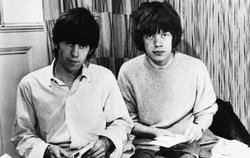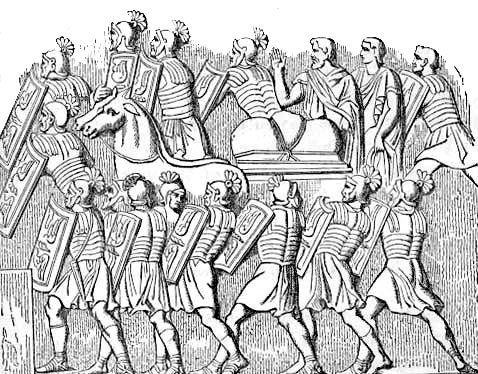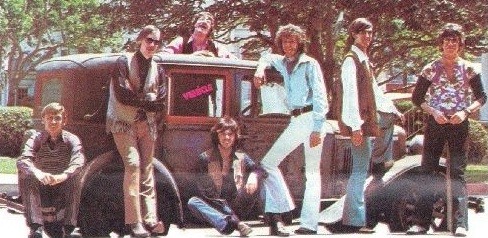|
From historic events and speeches to new-fangled inventions, we’ve been looking at people, places and things that are celebrating their 50th anniversaries in 2013. 1963 was obviously a swingin’ year because it birthed the Rolling Stones, Puff the Magic Dragon, Elizabeth Taylor’s Cleopatra film extravaganza, the first appearance of the Beatles on American television and Dr. Who. Oh, and La Gioconda (more commonly known as the Mona Lisa) went on display in the United States for the first time.  "Fanmail from some flounder?" Mick, Keith and the other two formed a band in 1962 and played the local clubs, but didn’t land a recording contract until May of 1963, when they signed with Decca Records (on the recommendation of George Harrison, who held no grudges considering that Decca had rejected the Beatles the year before). "Gee, Mr. Peabody, that's great news for the music industry and the cultural zeitgeist!" "Well, yes, Sherman, up to a point. However, now we are stuck with the rather unseemly sight of Mick Jagger still shaking his skinny, nearly 70-year old ass to the tune of 'I Can't Get No Satisfaction.' And people still paying to see it."  Original 45 Meanwhile, that folk-singing trio, Peter, Paul and Mary were busy warbling a tune that has spawned ceaseless debate over the past 50 years. Is “Puff the Magic Dragon” really an ode to weed or merely a fanciful children’s ditty the likes of which Raffi or the Wiggles probably couldn't have come up with on their best day? (Although Tom Chapin might give them a run for their money.) Listen and discuss amongst yourselves (again.)  Dig the braids, Liz, but the shadow's way too much... One of the most expensive movies ever made (originally budgeted at $2 million, it wound up costing $44 million, which adjusted for inflation, would be $323 million in today's dollars), Cleopatra reeked of scandal before it ever debuted. (Half of the budget was probably spent on Liz Taylor's blue eyeshadow and black eye liner!) This 1963 epic, directed by Joseph L. Mankiewicz, is an historical drama with all the elements: elaborate sets, intricate costumes, name actors, a factual basis, and an overlong script (just over four hours). La Liz wallows in the role of Cleopatra, the Egyptian queen who seduces Julius Caesar (Rex Harrison) in a political move to hold onto her empire. When Caesar is offed by the Roman Senators, Cleopatra turns to Marc Antony (Richard Burton) for his support, enslaving him with her feminine wiles. The film won four Oscars (cinematography, art direction, costumes, and visual effects), wrecked two marriages, launched a tempestuous affair and two more marriages (both between Taylor and Burton) and nearly bankrupted the studio that produced it, 20th Century Fox. But, I'll say this for her, the woman sure knew how to make an entrance. "Gee, Mr. Peabody, you won't see anything like that in tomorrow's Rose Bowl Parade!" "No, Sherman, you won't. And although you can't tell it from the video, why was Cleopatra so negative?" "Gee, Mr. Peabody, I don't know." "Because she was... the queen of denial." Before they appeared live on Ed Sullivan in February of 1964, the Beatles were featured on American television on December 7, 1963, via a CBS news featurette on the Fab Four and Britain's Beatlemania. "Gee, Mr. Peabody, I love that 'sheepdog' hairstyle." "Yes, Sherman, I've noticed. But I thought the reporter got a bit carried away with that 'sound of the proletariat' reference." "I know, it's only rock n'roll, but I like it." "Wrong band, Sherman."  And then there's Dr. Who, the television program first produced by the BBC in 1963. It follows the adventures of a mysterious time-travelling alien known only as "The Doctor." He's a Time Lord from the planet Gallifrey, who explores time and space with various companions in his TARDIS, which looks like an old-fashioned British Police Box. Dr. Who is currently the longest-running science-fiction series broadcast on television, spanning twenty-six years on its original run. Over fifty years, the role of the Doctor has been played by eleven actors. "So, Mr. Peabody, why haven't we run into him on our time travels?"
"Different network, Sherman."
2 Comments
Depending on your age, when the phrase "the ides of March" is intoned, you may first associate it with: a) a word that was used widely in the Roman calendar indicating the approximate day that was the middle of the month. The term "ides" was used for the 15th day of the months of March, May, July, and October. The Ides of March was a festive day dedicated to the god of war Mars and was a perfect excuse for a military parade to display the empire's martial might; b) the date on which Julius Caesar was assassinated in 44 B.C. Caesar was stabbed to death (23 times!) in the Roman Senate by a group of conspirators led by Marcus Junius Brutus ("et tu?") and Gaius Cassius Longinus; c) a quote from Shakespeare's play, Julius Caesar, in which Caesar is warned by a soothsayer to "beware the Ides of March;" d) Chicago's own band of favorite sons, The Ides of March, the boys from Berwyn, who scored the chart-topping hit "Vehicle," (I'm your...) in 1970. Singer Jim Peterik went on to lead the band Survivor ("Eye of the Tiger"), but has since reunited with original IOM band members; e) a film starring Ryan Gosling (the librarian's favorite pin-up) and George Clooney (who needs to be a librarian's favorite pin-up; f) the date Rob Blagojevich (disgraced ex-governor of Illinois, convicted of corruption) went to jail (maybe you have to be from Illinois to appreciate this one).
|
AuthorTo find out more about me, click on the Not Your Average Jo tab. Archives
February 2024
Categories
All
|






 RSS Feed
RSS Feed